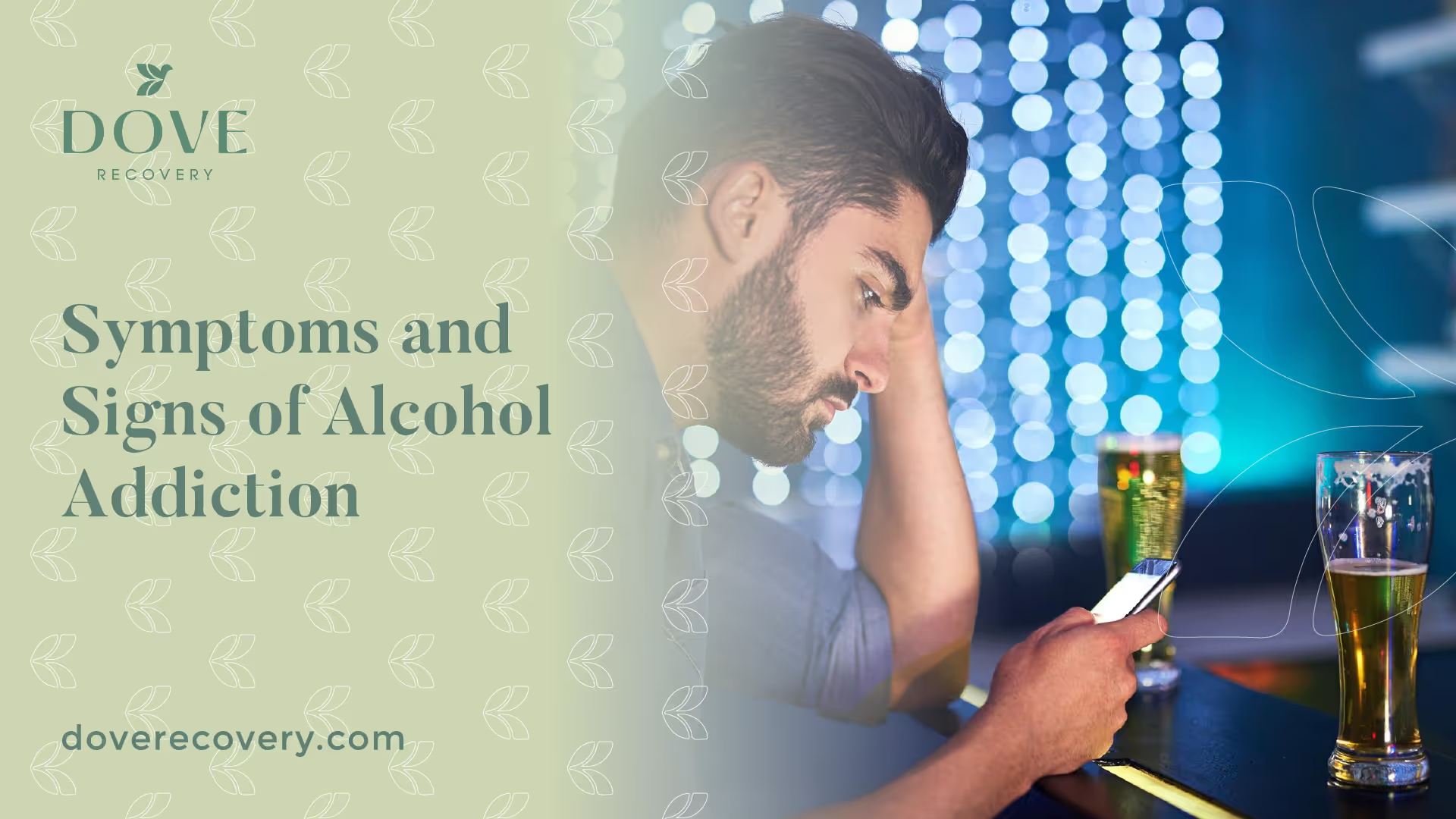Symptoms and Signs of Alcohol Addiction

Understanding Alcohol Addiction
Alcohol addiction is a complex and chronic disease that affects millions of individuals worldwide. It is important to have a clear understanding of what alcohol addiction entails and the significance of early detection.

What is Alcohol Addiction?
Alcohol addiction, also known as alcoholism, is characterized by a strong and uncontrollable craving for alcohol. It is a progressive condition that can have severe consequences on an individual's physical and mental well-being, as well as their relationships and overall quality of life.
Those struggling with alcohol addiction often find it challenging to control their drinking habits. They may continue to consume alcohol despite negative consequences, such as health problems, strained relationships, or difficulties at work or school. Over time, the body develops a tolerance to alcohol, requiring larger amounts to achieve the desired effect. Without intervention, alcohol addiction can lead to serious health complications and even be life-threatening.
The Importance of Early Detection
Early detection of alcohol addiction is crucial for effective intervention and treatment. Recognizing the warning signs and symptoms allows individuals and their loved ones to take proactive steps towards seeking help and support.
By identifying alcohol addiction early on, individuals have a higher chance of recovering and regaining control over their lives. It is important to remember that addiction is a treatable condition, and seeking assistance is a sign of strength and courage.
Understanding the signs and symptoms of alcohol addiction is the first step towards early detection. In the following sections, we will explore the various indicators that may signal a problem with alcohol, including changes in behavior, physical signs, and emotional shifts.
If you suspect that you or someone you know may be struggling with alcohol addiction, it is essential to reach out for assistance. There are numerous resources and treatment options available to support individuals on their journey to recovery.
Remember, early detection can make a significant difference in the outcome of alcohol addiction. Stay informed and be proactive in seeking help.
Recognizing the Early Signs
To effectively address alcohol addiction, it is crucial to be aware of the early signs that may indicate a developing problem. By recognizing these signs early on, individuals and their loved ones can take proactive steps towards seeking help and intervention. The following are some common early signs to watch out for:
Increased Tolerance
One of the early signs of alcohol addiction is an increased tolerance to alcohol. This means that a person needs to consume larger amounts of alcohol to achieve the desired effect or feel intoxicated. Over time, the body becomes accustomed to the presence of alcohol, leading to a higher tolerance level. Increased tolerance can be an indicator that the body is developing a dependence on alcohol and may be a sign of potential addiction.
Frequent Cravings
Experiencing frequent cravings for alcohol can be another early sign of addiction. Cravings often manifest as an intense desire or urge to consume alcohol, even when it may not be appropriate or necessary. These cravings can be triggered by various factors, such as stress, emotional distress, or social situations. Persistent and uncontrollable cravings may indicate a developing addiction and should not be ignored.
Neglecting Responsibilities
Another early sign of alcohol addiction is neglecting responsibilities. This can include a decline in performance at work or school, neglecting household chores, or failing to fulfill personal obligations. As alcohol consumption becomes a priority, individuals may begin to prioritize drinking over their responsibilities and commitments. Neglecting these responsibilities can have significant consequences on various aspects of a person's life, including relationships, career, and overall well-being.
Withdrawal Symptoms
Experiencing withdrawal symptoms when attempting to cut back or quit drinking is a clear indication of alcohol addiction. Withdrawal symptoms can vary in severity and may include anxiety, irritability, tremors, sweating, nausea, and insomnia. These symptoms occur when the body has become dependent on alcohol and struggles to function without it. It is important to note that withdrawal symptoms can be dangerous and potentially life-threatening, requiring medical attention and professional assistance.
Recognizing these early signs is crucial in addressing alcohol addiction. If you or someone you know is exhibiting these signs, it is important to seek help and support. There are various resources and treatment options available to assist individuals in their journey towards recovery Remember, early intervention can make a significant difference in overcoming alcohol addiction and leading a healthier, fulfilling life.
Behavioral and Emotional Changes
Alcohol addiction can manifest in various behavioral and emotional changes, which can serve as early warning signs of a developing problem. Recognizing these changes is crucial in order to address the issue before it escalates further. Let's explore some common behavioral and emotional signs of alcohol addiction.
Mood Swings and Irritability
One of the early signs of alcohol addiction is frequent mood swings and unexplained irritability. Individuals may experience sudden changes in their emotions, swinging from euphoria to anger or sadness. These mood fluctuations can occur even in situations that wouldn't typically provoke such strong reactions. If you or someone you know exhibits extreme mood swings without obvious triggers, it may be a sign of alcohol addiction.
Secrecy and Isolation
Individuals struggling with alcohol addiction often engage in secretive behaviors to hide their drinking habits. They may become increasingly secretive about their alcohol consumption, hiding bottles or containers, and avoiding discussions about their drinking. Moreover, they may isolate themselves from friends and family, withdrawing from social activities and avoiding interactions that could reveal their addiction.
Neglecting Hobbies and Social Interactions
As alcohol addiction takes hold, individuals may lose interest in activities they once enjoyed. They may neglect hobbies, sports, or other recreational activities they used to participate in regularly. Furthermore, they may distance themselves from their social circle, avoiding gatherings or events that don't revolve around alcohol. This withdrawal from hobbies and social interactions is often a result of the individual prioritizing alcohol consumption above all else.
Recognizing these behavioral and emotional changes is crucial in identifying potential alcohol addiction. Early detection can lead to timely intervention and treatment. If you notice these signs in yourself or someone you care about, seeking professional help is essential.
Remember, alcohol addiction is a complex condition, and professional guidance is necessary for effective treatment and recovery.
Physical Signs
Physical signs can serve as important indicators of alcohol addiction. Recognizing these signs early on can help individuals seek the necessary support and treatment. Here are some common physical signs to be aware of:
Changes in Appearance
One of the visible effects of alcohol addiction can be changes in physical appearance. Excessive alcohol consumption can lead to various physical manifestations, including:
- Weight gain or loss: Alcohol contains empty calories, and excessive consumption can contribute to weight gain. Conversely, some individuals may neglect proper nutrition while drinking, leading to weight loss.
- Skin problems: Alcohol can dehydrate the body, leading to dry and dull skin. Additionally, it may worsen existing skin conditions such as acne or eczema.
- Bloodshot or glassy eyes: Frequent alcohol consumption can cause blood vessels in the eyes to dilate, resulting in red or bloodshot eyes. Glassy or watery eyes can also be a sign of alcohol intoxication.
Poor Sleep Patterns
Alcohol can significantly disrupt sleep patterns, even if it initially appears to help with falling asleep. Some common sleep disturbances associated with alcohol addiction include:
- Insomnia: Alcohol can interfere with the body's natural sleep cycle, making it difficult to fall asleep or stay asleep.
- Restless sleep: Individuals with alcohol addiction may experience restless or disrupted sleep, often waking up multiple times during the night.
- Fatigue: Despite getting a full night's sleep, individuals may still feel fatigued and lack energy due to the poor quality of sleep caused by alcohol.
Frequent Hangovers
Experiencing frequent hangovers can be a sign of alcohol addiction. Hangovers occur due to the body's reaction to excessive alcohol consumption. Some common symptoms include:
- Headaches: Alcohol-induced headaches are a common symptom of a hangover. These headaches can be throbbing and accompanied by sensitivity to light and sound.
- Nausea and vomiting: Excessive alcohol consumption can irritate the stomach lining, leading to feelings of nausea and sometimes vomiting.
- Fatigue and weakness: Hangovers often leave individuals feeling exhausted and physically weak, making it difficult to carry out daily activities.
Recognizing the physical signs of alcohol addiction is crucial in identifying potential issues and seeking appropriate help. If you or someone you know is experiencing these signs, it's essential to reach out for support. There are numerous resources and treatment options available to assist individuals in overcoming alcohol addiction.
Seeking Help
Recognizing the early signs of alcohol addiction is an important first step, but seeking help is crucial for overcoming the challenges of addiction. Support from friends, family, and professionals can make a significant difference in the recovery process. If you or someone you know is showing signs of alcohol addiction, it's important to reach out for assistance.
The Importance of Support
Having a strong support system is essential when facing alcohol addiction. Support can come in various forms, including emotional support, encouragement, and understanding from loved ones. Family and friends can provide a safe and non-judgmental space for individuals struggling with addiction to share their experiences and seek guidance.
In addition to personal support, seeking professional help is highly recommended. Addiction specialists, therapists, and counselors can provide the necessary tools and guidance to navigate the recovery journey. They can help individuals understand the underlying causes of their addiction, develop coping mechanisms, and create a personalized treatment plan. Professional support can also involve medical supervision to manage any potential withdrawal symptoms.
Remember, reaching out for support is not a sign of weakness but a brave step towards a healthier and happier life. If you need assistance, don't hesitate to ask for help from trusted individuals or seek guidance from addiction treatment centers.
Finding Resources and Treatment Options
When seeking help for alcohol addiction, it's important to explore the available resources and treatment options. There are numerous organizations and facilities dedicated to helping individuals overcome alcohol addiction. These organizations offer a wide range of services, including counseling, therapy, support groups, and inpatient or outpatient treatment programs.
To find the most suitable resources and treatment options, consider the individual's specific needs, preferences, and severity of addiction. Consulting with a healthcare professional or addiction specialist can provide valuable guidance in selecting the right course of action.
Additionally, online resources and helplines can provide immediate assistance and connect individuals with the necessary support. These resources can provide information, guidance, and access to treatment centers or support groups in your area.
Remember, seeking help is an important step towards overcoming alcohol addiction. With the right support and resources, individuals can embark on a journey of recovery and regain control of their lives.
Conclusion
Alcohol addiction can seriously impact physical and mental health, relationships, and quality of life. Early detection and intervention are key to recovery. Seek help and support if struggling with alcohol addiction. Recognizing the early signs is crucial for effective treatment. With resources and support, individuals can recover and regain control of their lives.
Sources:
- https://www.mayoclinic.org/diseases-conditions/alcohol-use-disorder/symptoms-causes/syc-20369243
- https://www.niaaa.nih.gov/publications/brochures-and-fact-sheets/understanding-dangers-of-alcohol-overdose
- https://www.webmd.com/mental-health/addiction/understanding-alcohol-abuse-symptoms
- https://www.niaaa.nih.gov/alcohols-effects-health/alcohols-effects-body
